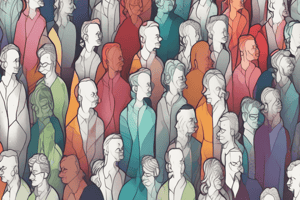Podcast
Questions and Answers
What is deindividuation?
What is deindividuation?
A psychological state characterised by lowered self-evaluation and low concern about how others view us.
How do Hogg and Vaughan explain deindividuation?
How do Hogg and Vaughan explain deindividuation?
A process whereby people lose their sense of socialised individual identity and engage in unsocialised, often antisocial behaviour.
How can we define deindividuation in terms of aggressive behaviour?
How can we define deindividuation in terms of aggressive behaviour?
When part of a relatively anonymous group, people lose their personal identity and their inhibitions about violence.
What is the theory of deindividuation based on?
What is the theory of deindividuation based on?
What does Le Bon's crowd theory suggest about deindividuation?
What does Le Bon's crowd theory suggest about deindividuation?
Give examples of factors that can increase a sense of deindividuation.
Give examples of factors that can increase a sense of deindividuation.
Give an example of how deindividuation may occur at a football match.
Give an example of how deindividuation may occur at a football match.
What does the deindividuation theory suggest about acts of aggression and violence?
What does the deindividuation theory suggest about acts of aggression and violence?
In terms of deindividuation, what did Zimbardo distinguish between?
In terms of deindividuation, what did Zimbardo distinguish between?
What are some real-life examples of deindividuation?
What are some real-life examples of deindividuation?
How can we link deindividuation to conformity?
How can we link deindividuation to conformity?
How do Prentice-Dunn and Rogers counter argue the idea that anonymity directly leads to aggression?
How do Prentice-Dunn and Rogers counter argue the idea that anonymity directly leads to aggression?
According to Prentice-Dunn and Rogers, what are the two types of self-awareness?
According to Prentice-Dunn and Rogers, what are the two types of self-awareness?
How do Prentice-Dunn and Rogers link the 2 types of self-awareness to deindividuation?
How do Prentice-Dunn and Rogers link the 2 types of self-awareness to deindividuation?
Explain Watson's 'Warriors' research into deindividuation.
Explain Watson's 'Warriors' research into deindividuation.
What are some strengths of Watson's warrior study?
What are some strengths of Watson's warrior study?
What did Mann find from his 'Baiting Crowd' study?
What did Mann find from his 'Baiting Crowd' study?
Study Notes
Deindividuation Overview
- Deindividuation is a psychological state marked by reduced self-evaluation and diminished concern about others' perceptions.
- It often leads individuals to engage in unsocialized and antisocial behaviors.
Explanation of Deindividuation
- Hogg and Vaughan describe it as a process where individuals lose their socialized identity within a group, resulting in behaviors that deviate from societal norms.
Aggressive Behavior and Deindividuation
- Group anonymity can strip away personal identity and inhibit self-restraint regarding violence.
Theoretical Foundations
- Le Bon's crowd theory serves as the basis for understanding deindividuation.
- It posits that in crowds, factors like anonymity, suggestibility, and contagion create a 'collective mind,' leading to loss of self-control and actions against personal norms.
Factors Contributing to Deindividuation
- Large crowds, wearing hoods or masks, nighttime settings, substance use, and adopting pseudonyms enhance anonymity, thus increasing deindividuation.
Real-Life Application: Football Match
- An example of deindividuation, exhibited when fans, influenced by the crowd, may act aggressively, losing individual identity in favor of group identity.
Responsibility and Anonymity
- The deindividuation theory suggests that anonymity results in a loss of personal responsibility, making individuals feel less accountable for aggressive acts.
Zimbardo's Distinction
- Zimbardo contrasts individuated behavior, which adheres to social norms, with deindividuated behavior, characterized by anonymity, freedom from guilt, and lower concern for societal standards.
Examples of Deindividuation
- Real-life instances include football hooliganism, activities in mosh pits, and behaviors in classrooms under substitute teachers.
Connection to Conformity
- Deindividuation can diminish personal control, fostering conformity to group norms.
Counter Arguments by Prentice-Dunn and Rogers
- They argue that it's not anonymity itself that drives aggression, but rather the consequences associated with being anonymous.
Types of Self-Awareness
- Two self-awareness types:
- Private self-awareness involves self-evaluation of behavior.
- Public self-awareness relates to concern for others' opinions.
Linking Self-Awareness to Deindividuation
- Anonymity leads to the loss of both private and public self-awareness, enhancing the likelihood of aggressive behavior.
Watson's 'Warriors' Research
- Watson posited that warriors altering their appearance before battle were more prone to commit atrocities.
- Research indicated a correlation, with most brutal societies changing their appearance before warfare.
Strengths of Watson's Study
- The study benefits from naturalistic observations, minimizing demand characteristics, and its cross-cultural approach suggests deindividuation may be a universal phenomenon.
Mann's 'Baiting Crowd' Study
- In analyzing cases of suicide, Mann found that baiting often occurred in larger, distant crowds at night, indicating that these conditions foster deindividuation.
Studying That Suits You
Use AI to generate personalized quizzes and flashcards to suit your learning preferences.
Description
Explore the concept of deindividuation with these informative flashcards. Learn about its definition, psychological implications, and how it can lead to unsocialized behavior. Ideal for psychology students looking to deepen their understanding of group dynamics.




